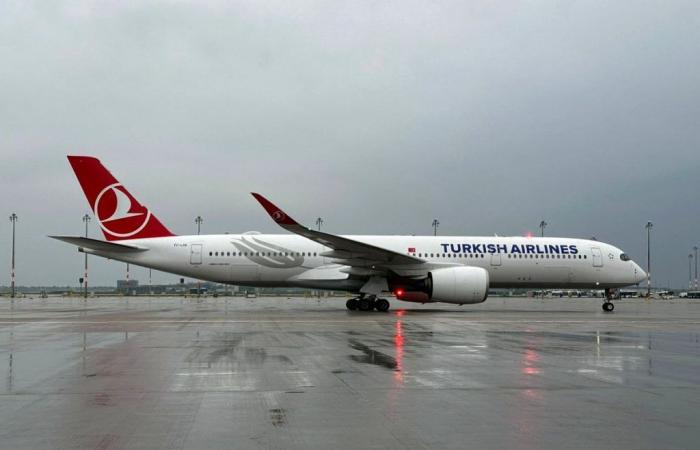A dramatic incident struck Turkish Airlines flight TK8, which was en route from Seattle to Istanbul, on October 2024, 204. During the flight over Greenland, 59-year-old captain Ilcehin Pehlivan suffered a health emergency and died before the emergency landing at New York’s JFK airport. Despite immediate reactions from the crew and emergency medical measures, the experienced pilot’s life could not be saved.
Flight TK204, operated by a Turkish Airlines Airbus A350-900, took off from Seattle-Tacoma International Airport at 19:01 p.m. local time. The aircraft was scheduled for an eleven-hour flight via northern Canada and Greenland to Istanbul. With 329 possible passenger seats, divided into 32 seats in Business Class and 297 in Economy Class, this flight is one of the many transatlantic connections that Turkish Airlines offers daily.
After about four hours in the air, when the aircraft was at a cruising altitude of 39.000 feet south of Baffin Island, the captain suddenly became incapacitated. The remaining cockpit crew, consisting of a backup pilot and a first officer, reacted immediately, declared an emergency and decided to make an emergency landing at the nearest suitable airport in New York JFK.
Failed rescue attempts and emergency landing
Despite all the efforts of the crew and the emergency medical care on board, the captain’s health could not be stabilized. The emergency landing at JFK airport took place at 02:56 a.m., about eight hours after departure from Seattle. When medical personnel boarded the plane, they unfortunately discovered that Captain Pehlivan had already died.
In a statement, the airline said: “The captain of our Airbus A350 aircraft, flight number TK204 from Seattle to Istanbul, fainted during the flight. The cockpit crew decided to make an emergency landing in New York, but our captain lost his life before landing.” Turkish Airlines expressed its deep sadness in its statement and offered its condolences to the family of the deceased pilot.
Medical examination and employment history
Ilcehin Pehlivan, the 59-year-old captain, had been working for Turkish Airlines since 2007 and had many years of experience in international aviation. His last routine health check was on March 8, 2024, and no health problems were detected that would have affected his work. The sudden health emergency that led to his death therefore comes as a tragic surprise.
The exact cause of his death is not known at the time of writing, but it is likely that an acute medical event – possibly a heart attack or similar event – left Pehlivan unable to continue his work. Such incidents in the cockpit are extremely rare, but they underscore the importance of the comprehensive health checks that pilots undergo on a regular basis.
Impact on passengers and air traffic
Following the emergency landing at JFK Airport, the Turkish Airlines Airbus A350-900 was grounded and passengers were forced to wait for alternative flight connections. Turkish Airlines arranged for the stranded passengers to travel from New York to Istanbul, offering a range of options. At this time, the aircraft remained in New York while further investigations into the incident were carried out.
The exact number of passengers on board the flight was not disclosed, but the aircraft in question has a maximum capacity of 329 people. Flight TK204 is one of Turkish Airlines’ daily routes between Seattle and Istanbul and is known for its regular departures at 18:40 p.m., arriving in Istanbul at 16:40 p.m. local time the next day.
A tragic event in aviation history
Captain Pehlivan’s death raises renewed questions about the health and wellbeing of pilots on long-haul flights. While regular medical check-ups are mandatory for pilots, the physical strain associated with long hours of duty and the stress of piloting a flight remains a central aspect of the profession.
The role of the co-pilots and reserve pilots, who can intervene in such emergencies, also shows how crucial the interaction within the cockpit is. Thanks to the quick reaction of the rest of the crew, the plane was able to land safely and there was no further accident for the passengers and crew.
A thought-provoking tragedy in the cockpit
The sudden death of the captain during a regular transatlantic flight has deeply shocked not only the Turkish Airlines family but also the aviation industry. This incident shows the unpredictability of medical emergencies, even in people who are regularly examined and declared fit to fly. Turkish Airlines acted quickly to manage the situation and its crew demonstrated professionalism and prudence in an extremely difficult situation.
It is hoped that this tragic incident will help to further increase the focus on the health care and well-being of flight crews in order to prevent similar accidents in the future.






